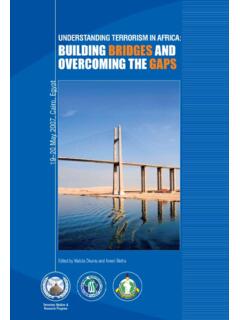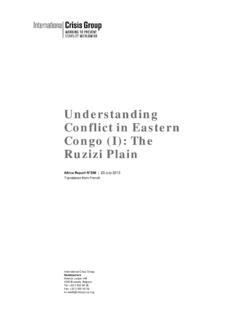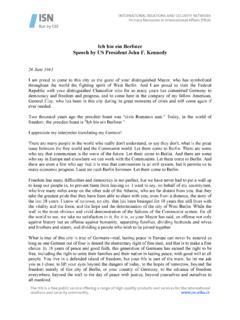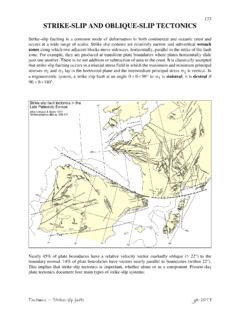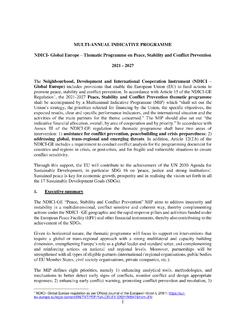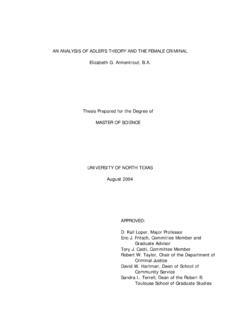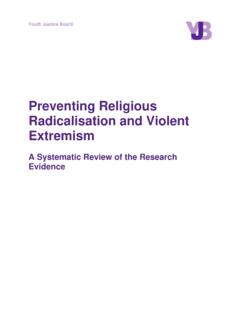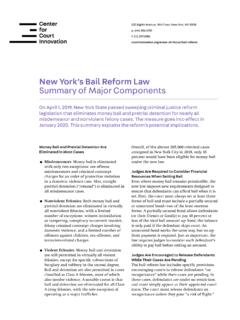Transcription of Boko Haram: Origins, Challenges and Responses
1 Policy Brief October 2014. boko haram : origins, Challenges and Responses By John Campbell Executive summary boko haram is a radical Islamist movement shaped by its Nigerian context and reflecting Nigeria's history of poor governance and extreme poverty in the north. The movement is unique in that it combines a sectarian, radical Islamic agenda with violence. Its stated goal is the establishment of a sharia state, but it shows little interest in actually governing or implement- ing economic development. It is based on the fundamentalist Wahhabi theological system and opposes the Islam of the traditional northern Nigerian establishment, which is broadly tolerant. boko haram and its more radical splinter, Ansaru, are steadily expanding their area of operations. Kidnapping has become a major source of revenue and is widespread, while attacks have occurred in Lagos and Kano. The government's response has been to treat boko haram as a part of the international al-Qaeda movement.
2 Security service abuses are likely a driver of some popular support for or acquiescence to boko haram . The struggle between the government and boko haram has dire humanitarian consequences. Many people have been internally displaced in northern Nigeria and many refugees have fled to neighbouring countries. The international community may be asked to help provide humanitarian assistance in what is one of the poorest parts of the world. Introduction In 1900 it is estimated that the territory that makes up boko haram is the popular moniker for an Islamist Nigeria was 26% Muslim and 1% Christian. The rest of the movement that calls itself the Sunni Community for the population adhered to traditional religions. However, Propagation of the Prophet's Teaching and Jihad .1 Unlike during the 20th century, and especially after independence, al-Qaeda and its affiliates, its focus is specifically on Christianity grew explosively in the south and centre of the Nigeria and adjacent countries rather than international country.
3 Its adherents may outnumber those of Islam, and jihad. The Nigerian context has shaped boko haram into due to internal migration there are now Christian minori- what it has become. ties in the predominantly Muslim north (Jenkins, 2007: 195). Nigerian political life is based on patronage-clientage networks, and religious and ethnic loyalties supersede A religious ethos saturates all aspects of Nigerian public those to the nation. There has been remarkable continuity and private life, whether Christian or Muslim. Moreover, between military and civilian governance, particularly in the cooperating and competing elites that run Nigeria terms of the isolation of the government from the people it exploit religious sentiments for their own purposes, while individuals and groups protesting against these elites also draw on religion to promote their own vision for Nigeria. 1 Jama'atu Ahles-Sunnah Lidda' Awati Wal Jihad. 2 With short civilian interludes, Nigeria had military governments from 1966 to 1999.
4 NOREF Policy Brief October 2014. Religious conflict is thus both a symptom and a driver of In that year there were altercations over local issues that conflict in the country. National identity remains underde- were likely manipulated by local politicians, which resulted veloped, and to some extent religion or religiosity fills in Yusuf ordering a direct attack on the state, to which the this void. security forces responded brutally. During the suppression of the uprising the police murdered Yusuf. This crime was captured on video and went viral on social media boko haram as a religious movement (Al Jazeera, 2010), while several hundred of Yusuf's boko haram 's combination of a sectarian agenda with followers were extrajudicially killed. The movement went violence is distinctive. According to the movement's underground, re-emerging in 2010 under the dead leader's rhetoric, its goal is to create God's kingdom on earth deputy, Abubakar Shekau.
5 Through justice for the poor achieved by the rigid applica- tion of Islamic law, or Anything that gets in the way The reconstituted boko haram sought revenge against the of this goal must be destroyed. For boko haram , violence is security forces and committed itself to the overthrow not a perversion of Islam; it is a justifiable means to a pure through violence of the Nigerian state government and the end. compromised Islamic establishment. The movement has called for the replacement of the sultan of Sokoto with The group adheres to the strict Wahhabi understanding of a shura (council) dominated by boko haram tawhid (the oneness of God or monotheism).4 According to (Soufan Group, 2013). boko haram rhetoric, a secular nation promotes idolatry, state worship. The pledge of allegiance to the flag and The size of Shekau's boko haram is unknown. However, it singing of the national anthem are manifestations of such has mounted operations involving at least 500 operatives, idolatry and hence punishable by death.
6 For boko haram implying several thousand members and affiliates the state is a nest of corruption that exploits the poor. The (Leadership, 2013). In addition, much larger numbers state is formed and sustained by Western values and appear to acquiesce to what boko haram is doing. education, both of which are against the will of Allah. boko haram is a recent manifestation of a decades-long Ansaru civil war within Islam. Radical reformers in what is now By origin a splinter of boko haram , Ansaru's base is in Nigeria have long claimed that Muslim leaders are infi- Kano and Kaduna. Its full name in English is Vanguards dels if they are unjust , even when the rulers themselves for the Protection of Muslims in Black Africa .5 Its leader- claim to be Muslims. This often manifests as a conflict ship is obscure; Abu Usama al Ansari is frequently identi- between Salafi fundamentalists and the tolerant Sufis who fied as its leader, but little other than his name is known.
7 Dominate the traditional Nigerian Muslim elites. Its spokesmen claim the group split from boko haram because of the latter's frequent killing of Muslims. Ansaru boko haram is thus a direct threat to the traditional Islamic avoids Muslim casualties and instead actively attacks establishment, which is led by the sultan of Sokoto and the Christian churches and government officials. shehu of Borno, both of whom the movement has tried to murder; it also claimed responsibility for killing the Ansaru has introduced tactics commonly associated with the shehu's brother and bodyguards of the sultan. Sahel and al-Qaeda that were previously unknown in West Africa, such as kidnappings and suicide bombers, including An aspect of the broad Islamist revival in northern Nigeria females. The group had links with radical Islamist groups in has been a Salafi rejection of the secular state. Charismatic Algeria and Mali, but it is unlikely that it takes direction from preachers organise communities that withdraw from them.
8 However, its fighters include some individuals from secular life. Usually, such groups are quietist, even outside Nigeria, especially Chad and Niger. There is evidence pacifists; however, at times they can turn violent, usually in of tactical cooperation between Ansaru and boko haram , response to the secular state's heavy handedness. Boko and it is possible that they have reunited. The Chibok haram 's trajectory is a classic example of such a response . schoolgirls' kidnapping has the flavour of Ansaru, but Shekau claimed responsibility. Ansaru has issued no public Mohammed Yusuf, a charismatic preacher, organised his statements for many months, which is another indication community in the city of Maiduguri around 2003. It sought that it may have merged back into boko haram . to establish God's kingdom on earth by isolating itself from wider society. Although the movement was hostile to the Nigerian state and rejected Western education as non- boko haram 's operational scope Islamic, it remained generally non-violent until 2009.
9 boko haram is concentrated in north-east Nigeria, but it has demonstrated national reach. It has carried out 3 boko haram has never issued a political manifesto or programme and appears to be uninterested in conventional politics or economic development . Its message is delivered through recorded sermons and video messages from Abubakar Shekau and other boko haram imams, word of mouth, and local Islamic teachers. 4 Wahhabism finds its strongest expression in Saudi Arabia. 5 Jama'atu Ansarul Muslimina Fi Biladis Sudan. 2. NOREF Policy Brief October 2014. operations in Plateau State, where ethnic and religious conflicts there. On the streets the traditional Islamic conflict has long been fierce. Shekau also claimed respon- establishment is seen as having sold out to secularism, sibility for a suicide bomb attack in the port of Lagos. making room for Boko Elsewhere in the north are other groups about which outsiders including the Nigerian government appear to know little.
10 Their grievances and violence are usually local, The government's response to boko haram although they use the Salafi rhetoric associated with The government's response to boko haram is to see it as a Shekau. Presumably, many of them have a criminal or terrorist movement in isolation from any environment that political dimension. may have fostered it, and state security forces have reacted with violent repression. The government's seemingly Funding for boko haram and other radical groups comes indiscriminate killing of alleged boko haram members and from bank robberies, kidnapping ransoms, the theft of many others who were simply in the wrong place at the weapons from government armouries, and especially in wrong time appears to be a driver of popular support for or the case of criminal groups smuggling. Remittances from acquiescence to boko haram (Amnesty International, 2014). overseas appear to play no role. terrorism in northern Nigeria is cheap.
